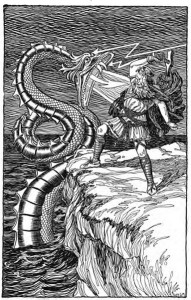
public domain
Everyone recognizes stereotypes – that’s why they’re so effective, and that’s why we continue to use them so often even when they’re grossly inaccurate. Though the subject could be (and has been) discussed for years as it relates to groups of people, I’d like to take some time to look at the stereotypes our deities and spirits are saddled with.
The one that sticks out most often to me is the idea of Thor as Strong but Stupid. I’ve had people roll their eyes and say things like “Thor smash!” when I talk about honoring Him. Even the Brosatru Viking- worshipers who value strength and manliness over all else talk about Thor as if He’s this big dumb muscle-bound guy ready to bring down wrath on anything and everything in His path.
This idea does not come from the Eddas, or any of the surviving lore. Yes, Thor is a fighter, and will happily use His hammer to smash opposition. But He is also clever. In the Alvissmal, Thor tricks the dwarf Alviss into reciting all of his gathered wisdom – all while Thor waits for the sun to come up and turn the dwarf to stone.
In the Hymiskvida, Thor and Tyr are running around looking for a cauldron deep enough for Aegir to brew drink for the Gods (apparently They got very thirsty on a hunting expedition). The two discover that Hymir has a large cauldron; but instead of just killing Hymir and taking it, the story takes on several interesting twists and turns as Thor attempts to secure the cauldron.
In my personal practice I honor Thunor, an Anglo-Saxon deity whose name is closely related to the Norse Thor. Don’t get me started on whether I think They are one and the same or somewhere in-between; the answer changes every week anyway. When I feel His presence, there is of course an immense strength there. There is also His fiery temper, easily roused.
But He is not just the God of warriors, of body-builders or of those dedicated to physical power or perfection. He is not just a deity of hotheads, or of those looking to justify their rash actions. More than anything, Thunor comes to me as the God of common human concerns.
Of the deities I’ve interacted with, He is the most likely to understand when I’m struggling to come up with money for a car repair, or when a boss is being awful. These things largely fall under the purview of the ancestors, but I feel that He understands them as well. Thor is portrayed by history and myth as a deity of fertile fields, of good rain for farmers, of many of the concerns that have been on people’s minds since prehistory.
I don’t think that this has changed since the modern era. I do believe that because of our culture’s stereotype of muscle-bound men being unintelligent, many portrayals and ideas of Thor have unconsciously acquired this additional layer (I’ve never read the comics, but I have to imagine that Marvel’s Thor hasn’t helped this stereotype much).
Of course, I’m not asking anyone who has experienced Thor in that way to change their minds because of what I’ve written. But if you’ve never been interested in Him because of this stereotype, it might be worth it to take a second look, at least to gather information and decide for yourself what you think of this red-haired, hammer-wielding thunder God.
















